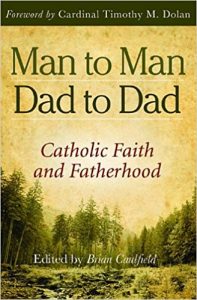Man to Man, Dad to Dad: Catholic Faith and Fatherhood
Edited by Brian Caulfield
 “Despite our best efforts, these are still difficult days for men and for fathers,” writes Brian Caulfield, editor of a newly published collection of essays titled “Man to Man, Dad to Dad.”
“Despite our best efforts, these are still difficult days for men and for fathers,” writes Brian Caulfield, editor of a newly published collection of essays titled “Man to Man, Dad to Dad.”
Caulfield believes “the joys of fatherhood are many.” At the same time, he points out that “many questions and uncertainties” surround a father’s role today.
The “identity and duties” of men and of fathers “have been in flux for decades, and it is time for us to start building something new and better from the shifting sands of our culture,” he says.
Caulfield is the editor of Fathers for Good, a website sponsored by the Knights of Columbus. His new book presents fatherhood as a vocation, “a call from God the Father.” However, he and 12 others who contributed essays to the book also take up issues related to marriage, sexuality, the theology of the body and understandings of manhood itself.
For “a man who has faith even the size of a mustard seed, there is a path for your marriage and your fatherhood that leads to the greatest satisfaction a person can have in this world – the grace and accomplishment of finding your vocation,” Caulfield states. “This book,” he says, “is designed to help you locate that path.”
I was happy to see the book’s essay by Ray Guarendi on discipline for children, always an important concern for parents. Here the well-known Catholic clinical psychologist presents “a five-point outline for being a disciplining, and disciplined, dad.”
Guarendi acknowledges that many parents find it hard to see “how love and discipline go together.” Both the importance of discipline and misunderstandings of its meaning are continuing concerns of his.
“The old image of Dad standing over a quivering kid with a belt is not the kind of discipline we’re looking for,” he says. Today, though, he thinks “too many parents are afraid to even look at their kids the wrong way for fear of injuring their delicate self-esteem.”
Guarendi holds that “discipline without love is harsh and can be abusive, while love without discipline can be just as damaging.” He calls discipline “a high – yet challenging – form of love.”
An essay by Gerald Korson on how families handle the stresses and strains of their children’s involvement in sports activities also offers practical suggestions to fathers and couples. Korson, a journalist, is a former editor of Our Sunday Visitor newspaper.
He asks a question familiar to multitudes of fathers: “Do you manage to keep team sports in perspective, encouraging the positive values of good sportsmanship and pursuit of excellence while not letting athletics take over your family?”
Parents are encouraged by Korson to help children learn to “win or lose with grace” and “to keep things in perspective.”
He admits that pride wells up when he “basks in” his children’s achievements. Yet, he writes, “I must guard against thinking that my offspring’s success can add to my stature.”
An essay by Caulfield discusses the difficult challenge for men of achieving a balance between work and life at home. “Men are good at immersing themselves at work,” an attractive option if they “get praise and pay raises at work, and headaches and demands at home.” Nonetheless, he advises, “Don’t fall into the workaholic trap.”
Among the book’s numerous other essays, one is devoted to the vital importance of forgiveness in family life, another to conquering an addiction to pornography. The importance of faith, prayer and the sacraments for families are accented throughout the book.
Repairing a broken marriage is the topic of an essay by Peter Kleponis, a licensed clinical therapist. He invites couples to consider what they can do “to save their marriage when it seems like it’s broken beyond repair.”
Kleponis’ list of eight key points for healing a marriage urges couples not to be “afraid to seek professional help,” to “work on forgiving each other” and be willing to change their behavior. In a final point, his list says to couples:
“Don’t give up! God wants to heal you, your spouse and your marriage.”
About the reviewer
David Gibson served for more than 37 years on the Catholic News Service editorial staff.
Disclaimer: Book reviews do not imply and are not to be used as official endorsement by the USCCB of the work or those associated with the work. Book reviews are solely intended as a resource regarding publications that might be of interest to For Your Marriage visitors.




